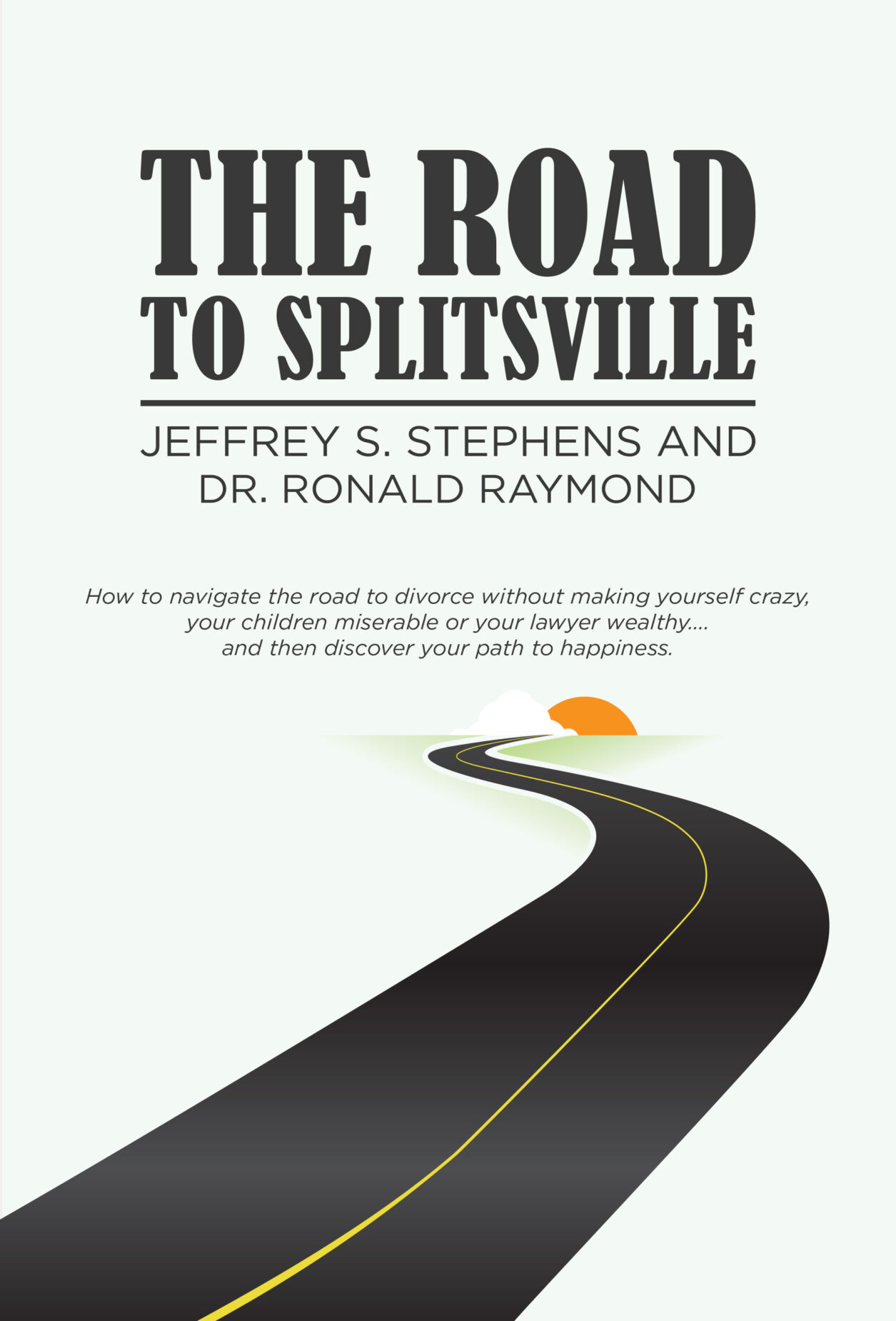The following is an excerpt from
THE ROAD TO SPLITSVILLE
by Jeffrey S. Stephens and Ronald Raymond
As you move through your divorce and toward your new life, it will be incredibly helpful if you take some time to identify the qualities about which you and your partner were in synch from early on, and those where you experienced a disconnect. Examine how these things developed and changed over the course of time. Be honest about yourself and your spouse. This is not an attempt to ascribe blame—it’s about recognizing the reasons why you fell in love in the first place and then fell out of love later. These factors are more primal than simply saying your partner is a cheater, an abuser, a neurotic, a drunk, a nag, or whatever. This is about the common needs and values that led to your original attachment and the differences that arose to drive the wedge between you.
In recent years, researchers have developed a way of understanding relationships they call “Attachment Theory” (Ainsworth and Bowlby). It refers to the emotional bond that explains how a relationship begins and is then sustained between two people. Attachment Theory began as a study of the child-parent relationship—the so-called “cradle to grave” phenomenon—but it was soon used to analyze the emotional bond that develops between adult romantic partners. It was found that the bond between infants and parents and the relationships between adult partners who “fall in love” share similar drives—a tendency to feel safe when the other is nearby; intimacy though physical contact; and the desire for communication in all its various forms. The more the parties share similar needs and means of satisfaction, the more likely the relationship will succeed.
So, you might ask, what does all this have to do with me and the hurt I am currently experiencing? Those questions are fair, but just stay with us. It will make sense.
Let us suppose your spouse was not much for discussions about feelings and emotions, but those things are important to you, something you consider a “must.” Or your partner was comfortable with anger and arguing, while that sort of behavior makes you uncomfortable, even intimidated. Or you enjoy physical contact, everything from handholding to back rubs, but your partner was not inclined to overt displays of affection. Or your spouse tended to be clingy and dependent while you cherish your independence. How do you think any of those relationships are going to fare? What sort of issues can you imagine arose for those couples?
And how will this play out for them in the future?
To assist in this evaluation, here is a simple set of questions that relate to your various levels of attachment for “THEN” (back when your relationship was young and promising) and “NOW” (when things have become bad enough to end the marriage).
Please take your time, use a pen and a pad—or even better, a notebook you can keep—and really dig deep for these answers. Create two columns on the page, one for THEN and one for NOW, and then fill out the answers as suggested below. You will find the results interesting and illuminating.
SPOUSAL ATTACHMENT SURVEY
The purpose of this exercise is for you to rate your spouse on each dimension below, both THEN—when you first married—and NOW—as you prepare to divorce.
You may be surprised to find how this will assist in freeing you from the painful aspects of your marriage coming to an end. You will begin to forgive yourself—and perhaps allow some forgiveness for your spouse—all of which will help you heal and move ahead.
Do not feel limited by this list, you may come up with additional questions for which you should provide ratings and insights. The more you delve into these behavioral categories, the more you will see how you and your spouse first came together and how you have diverged over the course of time. In this process you will also learn a lot about yourself, which will help as you look for a new mate.
We ask that you rate each of these factors on a scale of 1-10, a rating of 1 meaning it is a serious problem area and 10 meaning that you feel completely satisfied in this area as it should be in a good marriage relationship. This is one of our interactive sessions, and we ask that you not skimp on the effort. Take your time in considering each of these questions. As we said, be sure you use a notebook and pad where you write out your answers. Please do not use a computer, actually write your responses out longhand—there are proven psychological reasons why this method is preferred. In addition to the numerical score, write a sentence or two describing those feelings in each category for both THEN and NOW:
My spouse’s feelings toward me
My feelings toward my spouse
My spouse’s feelings toward other loved ones (family, friends, children)
My spouse’s reaction to my romantic advances
My reaction to my spouse’s romantic advances
My spouse’s reaction to my sexual advances
My reaction to my spouse’s sexual advances
My spouse’s need for freedom from me
My need for time away from my spouse
My spouse’s willingness to engage in discussions with me regarding our relationship
My willingness to engage in discussions with my spouse about our relationship
How much my spouse cares about me compared to how much I care about my spouse
How much I care about my spouse compared with how much my spouse cares about me
My spouse’s tendency to try and control our relationship
My desire to control the relationship
My spouse’s tendency to criticize me
My tendency to criticize my spouse
My spouse’s tendency to embarrass me in front of others
My tendency to embarrass my spouse in front of others
 Jeffrey S. Stephens is a native of New York City, author and a successful attorney in private practice, having handled many divorces and family law issues, both in New York and Connecticut. Stephens has lived for more than thirty years in Greenwich, which is where he and his wife Nancy raised their two sons, Graham and Trevor. Stephens is the author of the Jordan Sandor thrillers, Targets Of Deception, Targets Of Opportunity, Targets Of Revenge and Rogue Mission, as well as the Anthony Walker murder mystery Crimes and Passion and the Pencraft First Place Award winning novel, Fool’s Errand. Stephens newest novel is the just released thriller The Handler from Post Hill Press.
Jeffrey S. Stephens is a native of New York City, author and a successful attorney in private practice, having handled many divorces and family law issues, both in New York and Connecticut. Stephens has lived for more than thirty years in Greenwich, which is where he and his wife Nancy raised their two sons, Graham and Trevor. Stephens is the author of the Jordan Sandor thrillers, Targets Of Deception, Targets Of Opportunity, Targets Of Revenge and Rogue Mission, as well as the Anthony Walker murder mystery Crimes and Passion and the Pencraft First Place Award winning novel, Fool’s Errand. Stephens newest novel is the just released thriller The Handler from Post Hill Press.
 Dr. Ron Raymond is a clinical and neuropsychologist who has been practicing for over fifty years. His background includes being a professor and adjunct professor at several universities. The American Psychological Association attributed to him the development relocation psychology, about which he co-authored the book, Grow Your Roots Anywhere, Anytime. In private practice. Dr. Raymond has counseled children and adults, including many going through the issues of divorce. He is also the coauthor of Ring of Destiny, Destiny Revealed and The Four Essential Ingredients for Effective Parenting.
Dr. Ron Raymond is a clinical and neuropsychologist who has been practicing for over fifty years. His background includes being a professor and adjunct professor at several universities. The American Psychological Association attributed to him the development relocation psychology, about which he co-authored the book, Grow Your Roots Anywhere, Anytime. In private practice. Dr. Raymond has counseled children and adults, including many going through the issues of divorce. He is also the coauthor of Ring of Destiny, Destiny Revealed and The Four Essential Ingredients for Effective Parenting.




















